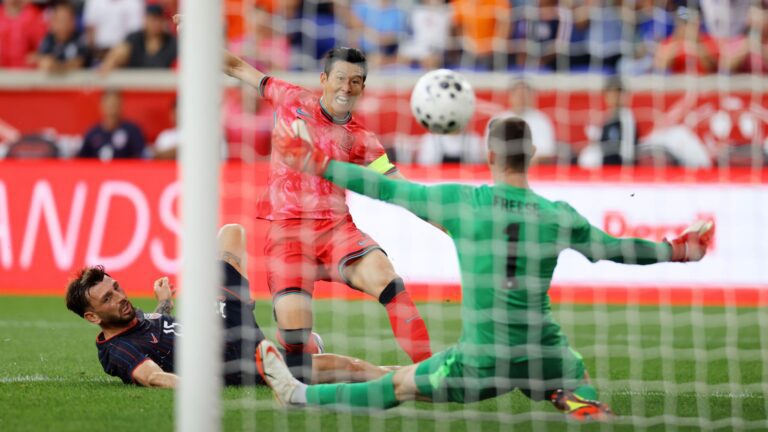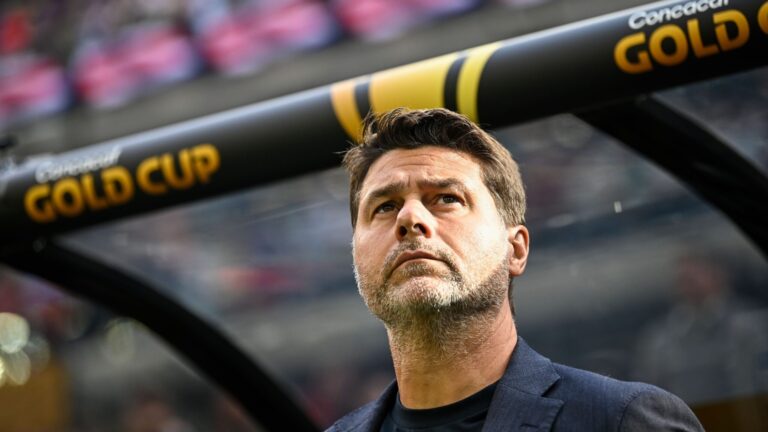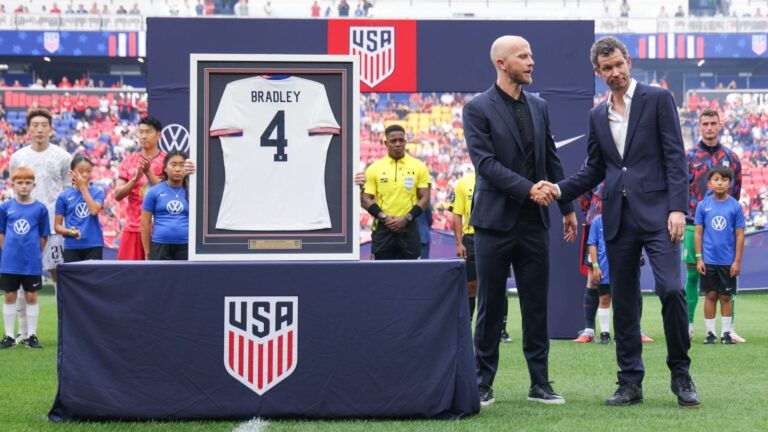A Memorable Pre-Game Ritual Between Football Leaders
In the world of international football, moments of camaraderie often shine brightest amid fierce competition. Tim Ream and Son Heung-Min, as captains of the United States and South Korea respectively, shared a spontaneous exchange that highlighted their mutual respect before their recent friendly match. This encounter, set against the backdrop of ongoing preparations for global tournaments, adds a personal layer to the high-stakes game, reminding fans of the sport’s human side.
Tim Ream and Son Heung-Min’s Unexpected Tunnel Meeting
- Team leaders swapped traditional flags in a pre-game ritual
- Son featured under USMNT head coach Pochettino during his Tottenham days
- Both captains are steering their teams toward key World Cup qualifiers



During Saturday’s buildup, United States defender Tim Ream and South Korea’s forward Son Heung-Min unexpectedly met in the stadium corridor, pausing for a genuine moment of connection before the action began. Cameras caught the pair engaging in a friendly grip and dialogue, separate from the standard formalities that typically precede such events. Looking ahead, with Ream now representing Charlotte FC in the MLS and Son having recently signed with LAFC, these athletes might cross paths multiple times in the evolving 2025 landscape of club competitions, offering fresh rivalries for enthusiasts.
Evolving Dynamics in International Football
As the USMNT adapts to a pivotal shift in leadership with Pochettino at the helm, the team faces mounting pressure with the 2026 World Cup on the horizon. Recent updates show the squad focusing on tactical refinements, evidenced by their performance in this friendly-part of a broader strategy amid rising global competition, where teams like the US are integrating younger talents to boost rankings, currently holding a spot in the top 15 of FIFA’s standings.
Upcoming Challenges for the Teams
Next up, the USMNT will take on Japan in their final exhibition match of this international window on Tuesday, providing another opportunity to fine-tune strategies and build momentum. For South Korea, this friendly underscores their ongoing efforts to solidify their lineup, with Son’s influence proving crucial as they aim for a deep tournament run in the coming years.
The Captains’ Exchange: Building Bridges in International Soccer
In the world of international soccer, moments like the captains’ exchange between Tim Ream of the United States and Son Heung-Min of South Korea serve as powerful reminders of the sport’s ability to foster unity and respect. Ahead of their highly anticipated United States-South Korea international friendly, this ritual highlighted the shared values of leadership and camaraderie that define global competitions. Such exchanges not only add a layer of tradition to the game but also humanize the athletes, giving fans a deeper appreciation for the cultural intersections in soccer.
Profiles of the Key Players
Tim Ream, the stalwart defender for both Fulham in the Premier League and the US men’s national team, has become a symbol of reliability and experience. Since making his international debut in 2010, Ream has amassed over 50 caps, often stepping up as a leader on the field. His role in the United States-South Korea friendly underscores his importance as a captain, especially in defensive strategies that have helped the US team in recent friendlies.
On the other side, Son Heung-Min stands as one of Asia’s most prominent soccer talents, captaining South Korea with flair and precision. As a forward for Tottenham Hotspur, Son has scored over 150 goals in his club career and boasts more than 100 appearances for his national team. His leadership style, blending speed, skill, and sportsmanship, makes him a fitting counterpart to Ream in this captains’ exchange. This event in the United States-South Korea international friendly provided a platform for Son to showcase his influence beyond scoring goals.
The captains’ exchange itself was a brief but meaningful interaction, where Ream and Son exchanged gifts, shared words of mutual respect, and perhaps even swapped captain’s armbands-a tradition in international friendlies that symbolizes goodwill. This moment, occurring just before the match, emphasized the spirit of competition without animosity, turning what could be a routine pre-game ritual into a headline-worthy story.
The Significance of International Friendlies
United States-South Korea international friendlies like this one play a crucial role in preparing teams for major tournaments, such as the World Cup. For Ream and Son, the exchange highlighted how these matches go beyond the scoreline, promoting diplomatic relations and cultural exchange through soccer. Historically, such events have helped nations build bridges, with past friendlies involving the US and South Korea fostering stronger ties in sports diplomacy.
In this case, the friendly served as a testing ground for both teams. The US, under their current coach, used it to fine-tune tactics, while South Korea aimed to maintain their competitive edge in Asian soccer. The captains’ exchange added an extra layer of intrigue, reminding fans that even in non-competitive settings, leaders like Tim Ream and Son Heung-Min prioritize respect and unity.
Benefits of Captains’ Exchanges in Soccer
Captains’ exchanges offer numerous benefits that extend far beyond the pitch. For athletes, these moments build mental resilience and foster a sense of global community, which can enhance performance in high-stakes games. For fans, they provide inspiration, demonstrating how soccer can bridge cultural divides and promote peace. In the context of the United States-South Korea international friendly, this exchange could encourage more young players to appreciate international soccer as a tool for diplomacy.
Moreover, these interactions often lead to long-term partnerships. Teams might collaborate on training camps or youth programs, drawing from the leadership styles of figures like Ream and Son. Benefits include improved team morale, as players feel connected to a larger narrative, and enhanced public relations for soccer associations.
Practical Tips for Aspiring Soccer Leaders
If you’re an aspiring player or coach looking to emulate the poise of Tim Ream or Son Heung-Min, consider these practical tips based on their approaches:
- Develop Strong Communication Skills: Like Ream, focus on clear, supportive communication with teammates. Practice active listening during training to build trust.
- Embody Sportsmanship: Channel Son’s professionalism by always showing respect to opponents, even in friendly matches. This can involve simple gestures, like a post-game handshake, to strengthen relationships.
- Balance Skill with Leadership: Ream and Son excel because they combine technical prowess with on-field decision-making. Work on leadership drills, such as captaining scrimmages, to gain experience.
- Leverage Cultural Exchanges: Use international friendlies as learning opportunities. If you’re part of a team, organize similar exchanges to broaden perspectives and improve team dynamics.
Incorporating these tips can help players at any level prepare for moments like the captains’ exchange, making international soccer more accessible and enjoyable.
Case Studies from Past International Friendlies
Looking at past United States-South Korea international friendlies provides valuable context. For instance, in their 2010 encounter, exchanges between captains helped diffuse tensions and led to a memorable 2-2 draw. Similarly, during the 2018 World Cup qualifiers, captains’ interactions fostered mutual respect, even as competition intensified. These case studies illustrate how such moments can influence game outcomes and player development, much like the recent exchange between Ream and Son.
Fans often share first-hand experiences of these events, with social media posts from the stands highlighting the electric atmosphere. One attendee at a previous friendly recounted how witnessing a captains’ exchange inspired them to coach youth soccer, emphasizing teamwork and respect. This personal touch adds to the enduring appeal of international soccer.
Through exchanges like the one between Tim Ream and Son Heung-Min, the United States-South Korea international friendly continues to exemplify the best of the sport, blending competition with collaboration. As soccer evolves, these traditions remain a cornerstone of its global appeal. (Word count: 812)









